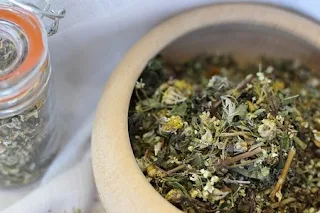Wormwood (Artemisinin) is an herb mainly grown in China and Vietnam. Artemisinin acts quickly against the malaria parasite and reduces the fever with few side effects. It also lowers the number of malaria parasites in the bloodstream, which helps to contain small outbreaks from becoming an epidemic. There is currently research underway using wormwood to treat cancer and other health issues.
What is Wormwood
Artemisinin, (pronounced ar-te-MIS-in-in), also called sweet wormwood is an herb mainly grown in China and Vietnam with test growing projects now in India and Tanzania.
The plant is started new each year from seed and only produces wormwood under certain agriculture and climate conditions that takes eight months to mature.
Artemisinin is an antimalarial herb extracted from the leaves of the Artemisia annua plant. It was an ancient Chinese remedy (qing hao su) and rediscovered by Chinese researches that isolated artemisinin in 1972.
Fighting Malaria with Wormwood
Wormwood acts quickly against the malaria parasites which are transmitted to humans by bites from Anopheles mosquitoes. It quickly reduces fever and has few if any side effects like other drugs.
It also lowers the number of malaria parasites in the bloodstream, which helps to contain small outbreaks from becoming an epidemic.
In 1991, during a malaria epidemic in Vietnam, the death rate was reduced by 97% because of the use of wormwood. It is taken along with other drugs to reduce the risk of drug-resistant malaria.
Coartem is the leading wormwood based treatment for malaria in the world. It is a mixture or cocktail of the drugs lumefantrine and artemether along with artemisinin. Coartem is the leading artemisinin-based treatment for malaria in the world.
In December 2008, an FDA panel said that clinical studies showed that the drug company Novartis’ anti-malarial drug was safe and effective. In April 2009, the FDA approved the use of Coartem tablets to treat malaria in the United States [1].
Malaria is still very prevalent around the world, in 2006 alone there were 247 million cases of malaria and 880,000 deaths in 109 different countries.
At a price of about $2.20 per adult course, the drug is still out of reach for millions of affected people.
How Wormwood Works
Chloroquine and sulphadoxine-pyrimethamine have been the usual remedy for malaria until more recently when malaria has become resistant to these treatments. It is still not completely clear how it works.
One theory is wormwood (artemisinin) clears parasites from the infected red blood cells by interacting with iron-rich debris from red blood cells as the parasite replicates throughout the body. This interaction then unleashes free radicals that go on to kill the malaria parasites.
Another theory now states that wormwood works by blocking the action of an enzyme called PfaTP6 that is important for pumping calcium in and out of red blood cells. It is believed that PfaTP6 is exclusive to the malaria parasite as the activator of its pump.
Cancer Research and Wormwood
Recent studies are showing that wormwood could be effective against leukemia, breast cancer, colon cancer and also other cancers.
Its use to kill malaria parasite is by the chemical reaction to the high iron concentration in malaria. wormwood, when in contact with iron creates free radicals that break apart and kill the parasite.
The relation to cancer is that malaria is high in iron and cancer cells require iron to replicate and cancer cells have much higher iron concentrations than normal cells.
Researches are hoping this can be that magic bullet that kills cancer cells while not harming surrounding healthy cells.
At this time, potent and target-selective artemisinin-compounds are being developed. These compounds are promising potent anticancer compounds that produce significantly less side effect than traditional chemotherapeutic agents [2].
Conclusion
About the Author
Copyright © 12 January 2009-2019 Sam Montana
Resources:

